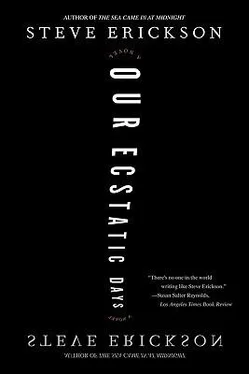both had seeped into me and I was bone dry, profoundly unmistakably empty,
light of an approaching train, Brontë will note it’s not so much like a full moon at all. But one night a few months before, before she can even imagine let alone know what’s to happen, out on the station platform one night she sees a globe of light emerge down the line over the far ridge and for a moment thinks it’s a train before realizing it’s the moon growing larger and larger like a plummeting airplane, its nose a burning bomb. That’s when she doesn’t believe in trains anymore. That’s when she thinks that she and the Mistress have as much chance of riding the moon to Chicago — assuming the moon ever traveled from west to east. But of course this moon like all others travels from east to west, back the way they came from. There in the pueblo station, what Brontë doesn’t yet know is that, as the four hundred days of the Pueblo d’Elektrik tick down, the two women come nearer their destination than she thinks: the end of the lie that they can or ever could leave the lake, or live beyond it.
Enthralled by her child, Barbrasita is paralyzed. In the weeks after his birth she can’t even bring herself to name the little boy, so afraid is she that her first maternal act will be a mistake, setting everything thereafter wrong. What if I name him something bad? she asks Brontë in broken English. She’s consumed with guilt about having cursed the baby when he was inside her. She’s convinced he heard every word, so now she pets his brown hair and begs his small brown eyes to forgive her. She seems to Brontë in a trance. One night when lightning strikes one of the railway cars outside, the reflection of the flaming mausoleum through the window makes the Indian’s face appear on fire, ecstatic, purged by love; that’s the night Brontë checks in one more time on the Mistress three doors down, turns down the lamp by Barbrasita’s bed, closes Barbrasita’s door behind her, and then takes off her clothes. Is the look on the Indian girl’s face just a variation of the
and then it was after that that I dreamed, for the first time in my life, not
one she always wears now as a mother, or a response to Brontë’s naked body next to her? Never with another girl before huh,Brontë whispers, careful should the wound of birth still be tender. Vixen, Bron të accuses herself, I’m no better than Rollin. Afterward, as the young Navajo woman sleeps in her breasts, wrapped in her long gold hair, out of her sleep Brontë reaches over in the dark and slowly rocks the cradle.
But in the ensuing days, the fire that’s been cast in Barbrasita’s face doesn’t die, rather ecstasy burns down to the diamond of a fixed notion. In her heart, her nameless little boy has opened the door to a vast plateau of fear, stretching out beyond her young years when mortality is supposed to be so inconceivable. In the beginning, perhaps her dread was attached to nothing she could name but now she can name it, pyre of the railway car outside flaming in her face: it’s the way she cursed him made manifest that’s coming for him. Like it was a thought wandering the desert waiting for her to rescue it, she’s come to know in no way she can explain even to herself that it doesn’t matter where she goes, it doesn’t matter how far she tries to get her little boy away,the lightning outside will keep coming for him, moving through the labyrinth of railway cars ring by outer ring, striking closer and closer, and that she can’t be paralyzed anymore. Out in the storm, out where the sky curses the earth in sound and light, lurks her son’s doom and she must stop it. She has to shake herself loose of the love that holds her down and find inside her the love that will save him. She has to go to war with the sky that would take him.
In the room three doors down, Brontë is alarmed by Lulu’s moans in her sleep. Oh jeez she’s going to die now, Brontë thinks to herself; she sits on the woman’s bed holding her, trying to calm her, but Lulu’s rant — stop her no no no stop, stop her, stop (in
realizing at first I was dreaming since I had never had a dream and didn’t
dreams of red) — grows from the depths of something else.Finally, not knowing what else to do, Bronte hurries from the room in search of Wanda only to find Barbrasita standing in the dark hall with her unnamed baby in her arms. Brontë can no longer see the fire in Barbrasita’s face but Barbrasita can, it’s right there in frontof her eyes, getting closer: “What are you doing?” says Brontë. She pulls the young mother back to bed. Then she starts back down the hallway knocking on doors like the night the baby was born, but this time Wanda doesn’t answer: “Where is everybody?” Brontë actually says out loud in the dark at one point. When she turns back to the room, Lulu’s ramblings growing louder and more agitated, Barbrasita is in the hallway again, with her baby in her arms again.
Brontë takes hold of the girl’s shoulders. “Go to bed,” she says.
Barbrasita answers, in what sounds to Brontë like remarkably good English, “I know what I know, and I must do what I must do,” and with that shoves the baby boy into Brontë’s arms. “Hey,” Brontë says, Barbrasita striding past her, and in the porticos of the pueblo the Indian girl pulls open the doors that then seem to blast apart in the storm.
“Hey, hey!” Brontë calls again, holding the child and running in confusion after the other woman, who stops only for a moment in the doorway. Only for a moment in the doorway, everything about Barbrasita’s ravaged life comes to a halt. She’s riveted by a calm that’s still secret to her. She’s riveted by a resolution beyond rationality, by some wisdom forgotten as soon as she’s seen it;’for a second, she lives in the red gazebo of her heart, standing at its placid center where her life surrounds her like a diorama. Brontë can hear her say very clearly, very calmly over the sound of the
know how to identify one or distinguish it from consciousness, rather in that
thunder, “Give him a good name,” and then the young mother runs out into the lightning.
“No!” Brontë screams after her. But Barbrasita runs for the burning railway car, not to meet the fire but to head off the storm’s advance and conduct up into her, between her legs, through the place she gave birth, all the sky’s electric rage. Just outside the blowing, slamming doors of the hacienda, ëronte is pelted by rain and wind, stopped in her tracks as she turns her back on the wet and cold to protect the baby; at her side Wanda has finally appeared, eyes wide, and Brontë goes on crying “No!” over her shoulder at Barbrasita now far beyond earshot in the dark distance splattered with wet light — until there streaks from the black sky a bolt that suspends the girl in a momentary glow. Then she’s gone. She’s stepped through a white rip in the sky to some other desert on the Other Side where mothers don’t fear for the loss of their children. Brontë thinks it’s her own cry that she hears until she realizes it comes from the other end of the pueblo, Lulu sitting up in her bed in her room tearing at the sheets around her.
Will they make a saint of her? Lulu wonders, collapsed back into her pillow and red dreams. Will they all come out and gather on the mesas surrounding the electric desert, revering the place where she went up in smoke, Saint Barbrasita of the Loud Light? Wherever she is now, on the Other Side of the cracked sky,does she wonder to herself, What have I done? What mad love made me abandon him, in order that I might believe I could save him from all the vagaries of life? Does she find herself burned into some place between chaos and God, neither within reach? Does she sing to herself if there’s a higher light, let it shine on me when it’s a higher light jagged like a knife she meant to take
Читать дальше











